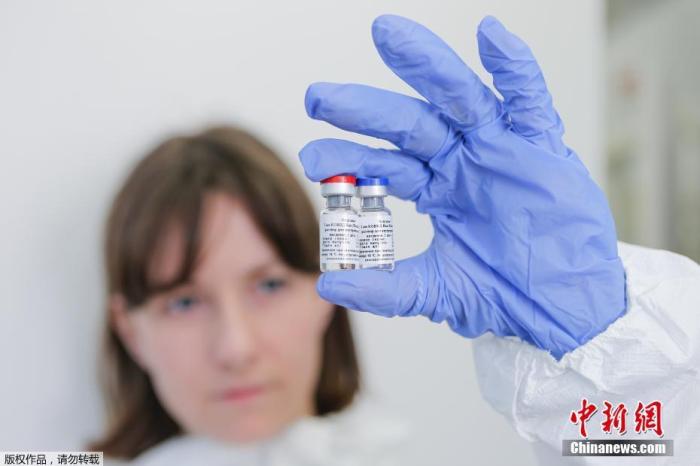(Fighting New Coronary Pneumonia) To fight the new coronavirus, international vaccine cooperation provides assistance
China News Agency, Beijing, August 20 (Reporter Zhang Shuo) In the battle against the new coronavirus, vaccines are considered one of the "biggest hopes". To this end, many countries are committed to developing international cooperation to provide assistance for the early development and production of vaccines. Including governments, international organizations, companies, etc., working hand in hand, will help vaccines get a reasonable and fair distribution on a global scale.
Data map: On July 21, 2020, local time, in Mumbai, India, a health volunteer from an NGO wearing protective clothing and a smart helmet equipped with a thermal scanning sensor checks the body temperature of residents from house to house in a residential area.
Asia: India and Bangladesh are “ready”
According to Singapore's "Straits Times" report, Indian Foreign Secretary Hash Waldhan Schillingra went to Dhaka, the capital of Bangladesh, on the 18th for a two-day visit. The Ministry of Foreign Affairs of Bangladesh issued a statement after the meeting stating that it is ready to cooperate with India for vaccine research and development.
According to data released by the Ministry of Health of India on the 20th, the cumulative number of confirmed cases in India has risen to 2,836,926. In the past 24 hours, India has newly confirmed 69,652 cases, the largest increase in a single day since the outbreak, with a daily increase of more than 50,000 for 22 consecutive days. Indian Prime Minister Narendra Modi delivered a speech on India’s Independence Day on the 15th, saying that India currently has three locally developed vaccines in different stages of testing. Once these vaccines are approved, India will begin mass production.
Data map: Recently, at the "Gamaleya" National Research Center for Epidemiology and Microbiology in Moscow, Russia, staff demonstrated the new crown vaccine.
Europe: Push the largest measure of new crown drug research and development
On the 18th local time, the "New Coronavirus Europe Accelerated R&D Alliance", a drug research and development alliance aimed at accelerating the new coronavirus and potential future coronavirus threats, was officially established. This is also the largest initiative in Europe for the development of new crown drugs.
The project lasts for 5 years, and 37 member units from China, the United States, the United Kingdom, Germany, Belgium, etc. have joined. The alliance has put forward a strategic plan for the development of new coronavirus drugs, and has received approximately 77 million euros in support from the European Union and a dozen European pharmaceutical companies and related partners.
Vaccine research and development cooperation not only makes it possible for the world to successfully contain the epidemic, but also helps to make vaccines get a fair distribution globally. In response to this, WHO Director-General Tan Desai said on the 18th that "nationalism" in the field of vaccines should be opposed. Once it is determined that an effective vaccine is developed, the WHO Strategic Advisory Group will provide advice on the rational and fair distribution of vaccines. .
Latin America: promised to supply with "fair access"
Relevant statistics show that the cumulative number of confirmed and dead cases in Brazil ranks second in the world, second only to the United States. Since Russia recently announced the registration of the world's first new crown vaccine "Satellite V", Brazil has expressed interest in purchasing "Satellite V".
According to the Russian Sputnik News Agency, the Russian Direct Investment Fund, which finances the development of the "Satellite V" vaccine, announced that the fund has reached a consensus on the production and sales of the "Satellite V" cooperation with the Brazilian State of Parana. Sales in Latin America.
In addition, the Latin American and Caribbean Community of 33 countries ("LAC") held a ministerial video conference on the 17th to reach a consensus on accelerating the development, production and equitable access of vaccines in the region through international cooperation.
Argentine President Fernandez and Mexican President Lopez have previously announced that the two countries will jointly produce vaccines developed by the University of Oxford and other institutions in the United Kingdom. It is planned to start production this year and early next year, and will supply the Latin American market with a "fair access method". (Finish)

